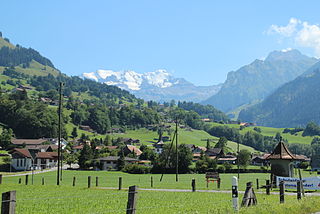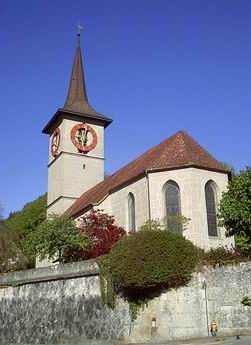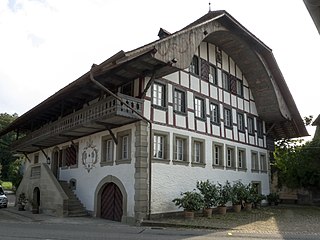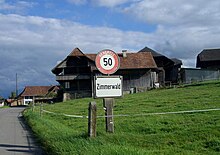
Bern or Berne is the de facto capital of Switzerland, referred to as the "federal city". With a population of about 133,000, Bern is the fifth-most populous city in Switzerland, behind Zurich, Geneva, Basel and Lausanne. The Bern agglomeration, which includes 36 municipalities, had a population of 406,900 in 2014. The metropolitan area had a population of 660,000 in 2000.

The canton of Bern or Berne is one of the 26 cantons forming the Swiss Confederation. Its capital city, Bern, is also the de facto capital of Switzerland. The bear is the heraldic symbol of the canton, displayed on a red-yellow background.

Biel/Bienne is a town and a municipality in the Biel/Bienne administrative district in the canton of Bern in Switzerland.

Spiez is a town and municipality on the shore of Lake Thun in the Bernese Oberland region of the Swiss canton of Bern. It is part of the Frutigen-Niedersimmental administrative district. Besides the town of Spiez, the municipality also includes the settlements of Einigen, Hondrich, Faulensee, and Spiezwiler.

Herzogenbuchsee is a municipality in the Oberaargau administrative district in the canton of Bern in Switzerland.

Wald is a municipality in the Bern-Mittelland administrative district in the canton of Bern in Switzerland.

Englisberg is a village in the district of Seftigen in Canton Bern, Switzerland. On January 1, 2004, the independent municipality merged with Zimmerwald to form the new municipality of Wald BE. Situated on the Längenberg, above the valley of the Aare river, it combines the villages of Englisberg and Kühlewil. Englisberg is first documented in 1166 [Endlisperc]. It is believed that Englisberg was created out of the much older village of Kühlewil [Cullenwil, Cullenwilare - originally of Celtic origin] the latter of which having since attained the status of a hamlet of the former. In the 14th century a castle is documented in Englisberg, owned by the family of the same name. It was abandoned by the following 15th century and quickly fell into disrepair and disintegration. The feudal rights over Englisberg were acquired by the von Erlach family of Bern in 1433 and passed in 1542 to the Baumgartner family of the same place. After 1570, these feudal rights were sold to local farming families Guggisberg and Zimmermann which over the course of several generations were split into 70 shares. In the 18th century, these rights were successively purchased by the aristocratic von Graffenried and von Tscharner families seated at the Lohn estate in Kehrsatz only to lose it all when Switzerland was invaded by the French in 1798 that resulted in the abolishment of the ancient order. Englisberg belonged until 1798 to the high court district of Seftigen. Ecclesiastically Englisberg was part of the evangelical reformed parish church of neighboring Belp till 1699 and thereafter was integrated into the newly created parish of Zimmerwald.

Mark Thomas Streit is a Swiss former professional ice hockey defenceman. He was formerly the captain of both the New York Islanders and the Swiss national team. Streit was one of the few swingmen in the NHL who could play both as a defenceman and as a forward. He was inducted into the IIHF Hall of Fame in 2020.

Reichenbach im Kandertal is a village and municipality in the Frutigen-Niedersimmental administrative district in the canton of Bern in Switzerland. Until 1957 it was known as Reichenbach bei Frutigen. Besides the village of Reichenbach, the municipality includes several other settlements, including Aris, Faltsche, Griesalp, Kien, Kiental, Ramslauenen, Reudlen, Scharnachtal, Schwandi and Wengi. Additionally, the village of Mülenen is shared between Reichenbach and Aeschi bei Spiez municipalities.

Bolligen is a municipality in the Bern-Mittelland administrative district of the canton of Bern, Switzerland.

Muri bei Bern is a municipality in the Bern-Mittelland administrative district in the canton of Bern in Switzerland.

Oberburg is a municipality in the administrative district of Emmental in the canton of Bern in Switzerland.

Herbligen is a municipality in the Bern-Mittelland administrative district in the canton of Bern in Switzerland.

Niedermuhlern is a municipality in the Bern-Mittelland administrative district in the canton of Bern in Switzerland.
Rumisberg is a municipality in the Oberaargau administrative district in the canton of Bern in Switzerland.

Seeberg is a municipality in the Oberaargau administrative district in the canton of Bern in Switzerland. The lake Burgäschisee is located on the border with Aeschi. On 1 January 2016 the former municipality of Hermiswil merged into Seeberg.
Wiedlisbach is a municipality in the Oberaargau administrative district in the canton of Bern in Switzerland.
The Oberaargau is the region that encompasses the upper watershed of the Aar River in the canton of Bern in Switzerland. On the north, lie the Jura Mountains, and on the south the hills leading to the Emmental.

The Swiss Space Office (SSO) is the federal government's competence centre for national and international space matters. In its role it cooperates closely with other federal offices and is responsible for the preparation and implementation of the policy and strategic orientations of the space domain in Switzerland. The SSO is part of the State Secretariat for Education, Research, and Innovation. The Head of the SSO is Dr. Renato Krpoun.
The International Socialist Commission, also known as the International Socialist Committee or the Berne International was a coordinating committee of socialists parties that adhered to the idea of the Zimmerwald Conference of 1915.




























